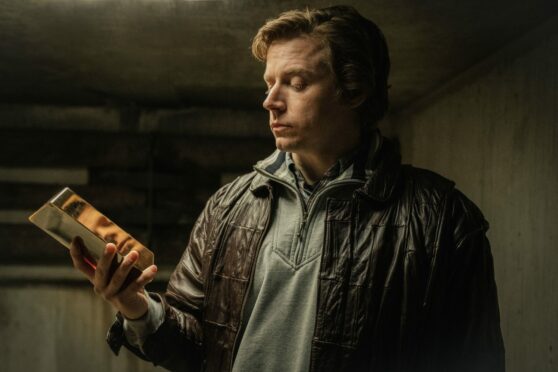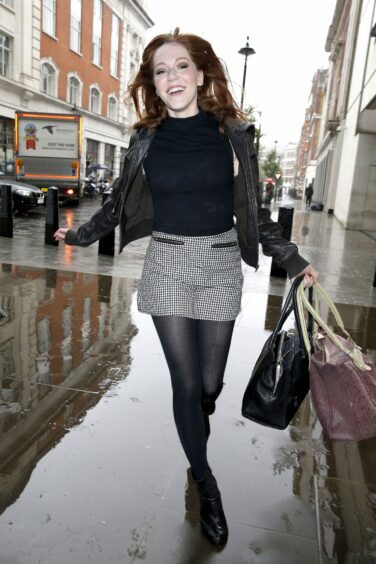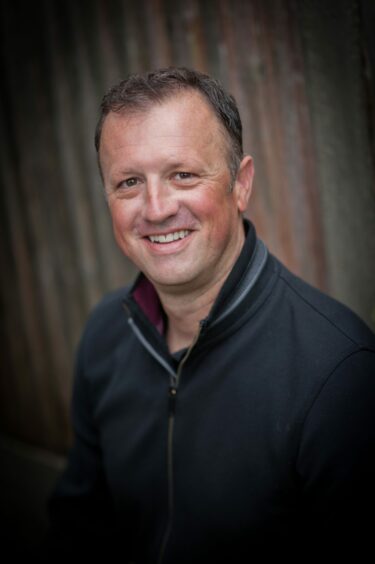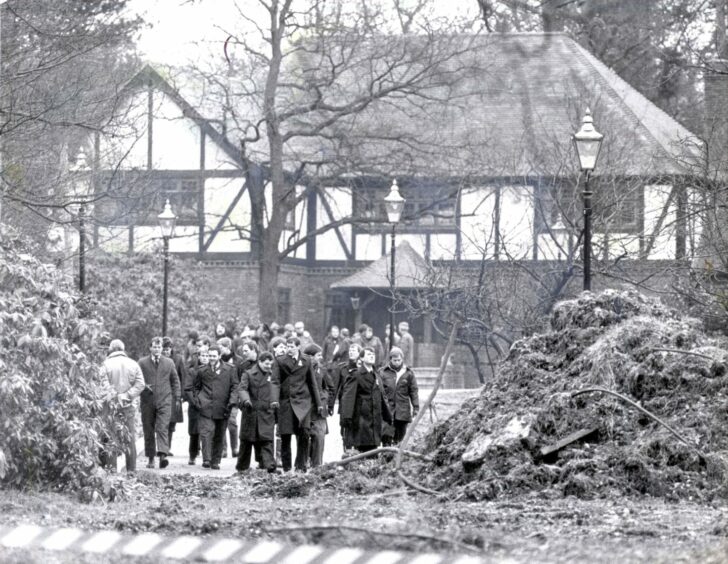
A week after being left breathless by the last episode of Happy Valley, viewers will tonight be gripped by the drama charting the aftermath of a real-life bullion heist.
The show’s writer, Neil Forsyth, also knows how it feels to strike gold, except his success has come from honest, hard graft.
The Dundonian behind Guilt and Bob Servant has been given the daunting task of following writer Sally Wainwright’s acclaimed Happy Valley in the BBC’s prestigious Sunday-night drama slot.
It’s a moment he has been working to achieve for more than 20 years and he feels ready to take on the challenge.
“It only puts pressure on me in terms of the very significant viewing figures Happy Valley received and the fact it’s a great show but they didn’t put all the episodes up on iPlayer at once like we are doing, so that alleviates the pressure a little. It’s nice company to be in and a nice slot to get,” he said, sipping from a Dundee United mug.
Forsyth’s cinematic six-part series, The Gold, is based on the true story of the 1983 Brink’s-Mat robbery in London, when six armed men stole £26 million of gold bullion. At the time, it was the biggest theft in world history and gave birth to large-scale international money laundering. It features an all-star cast of Hugh Bonneville, Jack Lowden, Charlotte Spencer, Dominic Cooper and Emun Elliott and is directed by Aneil Karia, who won an Oscar midway through shooting for short film The Long Goodbye.
It is the biggest project Forsyth has been involved in to date but it is one he has been working towards for more than two decades. “You don’t get to make a show like The Gold straight out of the traps,” he said. “You have to prove your worth and feel like you’re capable of helping to guide a production of this size.
“It definitely feels another level in terms of profile and things like budget and attention and everything else but I’ve always worked very hard. But it did feel like a new world. We shot some of The Gold in Spain and I was standing there watching this large production taking place, and it was amazing.
“I’m enjoying writing on that bigger canvas but creatively it boils down to story and character; you can’t take your eye off the ball and think because you have the budget you can put bells and whistles on it – none of that can ever be a substitute for story and character.”
The Gold is made by Forsyth’s production company, Tannadice Pictures, which was established in 2020 and allows him more ownership and greater creative freedom. It was also set up to give him more scope to work with emerging Scottish writers and give them the same breaks he had.
“I’m working with a couple of great younger writers at the moment. I’m trying to help writers who I think are fantastic but haven’t broken through yet to make their first TV shows,” said Forsyth, who pinpointed three breakthroughs that were life-changing for him.
“There were a few points of incredibly good fortune in my life that made a big difference. Irvine Welsh chose my first Bob Servant book, Delete This At Your Peril, as the funniest book he’d ever read for a poll in Esquire magazine. At the time the book was basically out of print but what he said was enough to get it republished and that’s when BBC Scotland got a hold of it.
“Brian Cox agreeing to do Bob Servant when it was a lunchtime Radio Scotland show – that made a huge difference and it would never have gone all the way to TV had he not been involved.
“And Guilt – I met Ewan Angus, who was the BBC Scotland controller at the time the new channel was starting and he said he was looking for a big show to launch it. I had this idea, so I texted him on the Friday and he replied over the weekend saying it was what he was looking for.
“It’s moments like that – you need people to believe in you and give you a shot and that’s what we’re hopefully going to do with Tannadice. Nothing would give me greater pleasure than to find an emerging Scottish writer and guide them all the way to production. We have a couple of possibilities just now.”
This year marks the 10th anniversary of Forsyth’s television breakthrough with Bob Servant Independent, a quote-worthy comedy about a local cheeseburger tycoon turned political hopeful in Broughty Ferry.
“It took three years to get Bob to TV and it was probably 15 years of working towards writing those scripts,” he said. “I was writing books before that. I’ve been writing professionally for 20 years but the first six or seven years you could put professionally in inverted commas because at the same time I was working in a pub in Edinburgh. It’s been a long, old journey and a lot of hard work but also of people believing in me, helping me and giving me opportunities.”
The Gold has been several years in the making and involved such exhaustive exploration that he has co-written an accompanying book with the show’s researcher, Thomas Turner, because there was so much detail uncovered they could not fit it into six hours of television.
“I didn’t remember it because I was only five years old and living in Dundee but over time I became aware of it,” Forsyth said about the infamous robbery. “But it was only when I began to look into it three or four years ago that I realised just how interesting it is, and in some ways the robbery is the least interesting part.
“It’s a heist and it’s dramatic and we show it in the opening episode but what happens next is fascinating; how complicated it becomes and how so many people from all walks of life get sucked into it and how it spreads through England, Europe and around the world.
“What I found fascinating is the many layers. There’s the robbery and the south London professional robbers who were out of their depth and didn’t know what to do with the gold they stole. Then there’s a new level of criminal – the 1980s wheeler-dealer, upwardly mobile businessmen with one foot in the criminal enterprise; people like Kenneth Noye and John Palmer (played in the series by Jack Lowden and Tom Cullen), who took the gold, smelted it, disguised it and sold it back to the British gold market. If you bought a new piece of gold jewellery in Britain from 1984 onwards, within it would have been traces of the Brink’s-Mat gold.
“They didn’t know how to launder all the proceeds of money that came from it, so then there is another layer – the white-collar criminals like solicitors who were outwardly respectable but were sucked in. They laundered it through Swiss and Liechtenstein bank accounts and then invested the clean money in property throughout England. There’s whole developments in the London docklands built at some level on laundered money. It’s a story that starts small and gets bigger and more complex.”
As part of his research, Forsyth interviewed one of the robbers – he didn’t name which – and Brian Boyce, the detective who headed up the task force investigating the crime.
“He was invaluable. He was quite hard to find and, when we did, he was understandably cautious but that was so helpful to get an insight into the police investigations. Myself, Brian and Hugh Bonneville, who plays him, went for a long lunch and I think Hugh got a huge amount of value from that in terms of the feel of the man, his outlook on life and mannerisms.”
Forsyth was the series’ showrunner, meaning he was across every aspect from beginning to end. “Every day, there were endless things to look at, sign off and chip in on,” he said. “I underestimated just how demanding it would be to make a show the size of The Gold. I was still writing scripts for the third series of Guilt at the time, and filming was happening on a film I wrote, a biopic about Samuel Beckett called Dance First.
“There was one week when we were filming The Gold in London, then Spain, and then I went to Budapest for a couple of days where the Beckett film was being shot, and all the time I was trying to finish the Guilt script on planes, in airports and in the back of taxis.”
The Beckett film, starring Gabriel Byrne as an older Beckett, Fionn O’Shea as the younger version, Aidan Gillen as James Joyce and Maxine Peake, is directed by another Oscar winner, James Marsh, and is due for release in the autumn.
Before that is the third and final series of Guilt, on screens in April. The black comedy about two chalk-and-cheese, sharp-talking brothers – played by Mark Bonnar and Jamie Sives – who find themselves in all sorts of bother, had a cult following on BBC Scotland before quickly developing into a global hit.
“I’m really happy with it. Jake and Max are in great form and there’s some brilliant new characters and we bring back a couple of older ones.
“It was satisfying to write a finish and getting to wrap it up. It was definitely the right decision to end it.”
After an exhausting 2022, Forsyth is turning his attention to writing. “I’m writing scripts just now with that blind belief they’ll get made, although I’m always liable to be disappointed somewhere down the line,” he said. “Writing is the part of the process I enjoy the most, when everything is possible.”
The Gold, BBC1, tonight, 9pm, and then all episodes on the iPlayer
The Gold: The Real Story Behind Brink’s-Mat by Neil Forsyth and Thomas Turner is out on Friday

Enjoy the convenience of having The Sunday Post delivered as a digital ePaper straight to your smartphone, tablet or computer.
Subscribe for only £5.49 a month and enjoy all the benefits of the printed paper as a digital replica.
Subscribe © Beretta/Sims/Shutterstock
© Beretta/Sims/Shutterstock © SYSTEM
© SYSTEM © Geoffrey White/Daily Mail/Shutte
© Geoffrey White/Daily Mail/Shutte